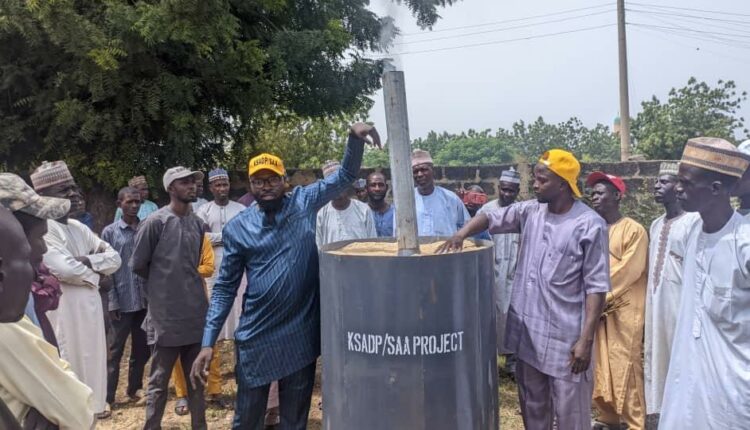KSADP, SAA train farmers, extension agents on Biochar production, utilization in Kano
Kano State Agropastoral Development Project (KSADP) in collaboration with Sasakawa Africa Association (SAA) has trained farmers, extension agents (EAs), and community-based farmers (CBFs) in Kano State on Biochar production and utilization.
SOLACEBASE reports that the training covers both the theoretical and practical aspects of Biochar production. It is designed to help farmers improve their soil health and crop yields while reducing their reliance on chemical fertilizers and other inputs.
This is contained in a statement issued by Moses Nongoatse, Communication Officer, Sasakawa Africa Association Nigeria, on Saturday.
The statement said Biochar is a carbon-rich material produced by pyrolyzing biomass (plant or animal matter) in a low-oxygen environment.
Read Also: JUST IN: Bandits abduct two varsity students in Zamfara, again

According to the statement, it is a stable and porous material that can be added to soil to improve its health and fertility. Biochar is well-suited for regenerative agriculture promoted by Kano State Agropastoral Development Project (KSADP) through Sasakawa Africa Association (SAA) in the state to, increase soil carbon content, improve water holding capacity, increase nutrient availability, Support soil microbial life, improve soil structure and Reduce soil acidity
‘’In addition to these benefits, Biochar can also be used to remediate contaminated soils, improve manure management, and reduce methane emissions from livestock production,’’ the statement said.
The training activity contains a theoretical overview of Biochar production, including its benefits, different types, and pyrolysis process. The trainees will also learn how to identify and select suitable feedstock materials for Biochar production and how to operate a pyrolysis reactor.
The practical sessions of the training will focus on the pyrolysis process itself. The trainees will learn how to load the feedstock materials into the reactor, control the pyrolysis temperature, and collect and store the Biochar. They also learn how to troubleshoot common problems during Biochar production.
Read Also: Poultry association loses N6bn to fuel subsidy removal, cash crunch
Furthermore, the trainees learn how to apply Biochar to the soil and crops. They will also learn how to store Biochar and test its quality.
In addition to the training, KSADP, through SAA, will also provide the trainees in each location with a Biochar production kit, which includes a pyrolysis reactor, a feedstock grinder, and a supply of feedstock materials. This will allow the trainees to start producing their own Biochar immediately and begin to reap the benefits of this innovative farming practice.
“We are excited to offer this ongoing training program to farmers, EAs, and CBFs,” said Abdulrasheed Hamisu Kofarmata, Project Coordinator, Kano State Agropastoral Development Project, KSADP at SAA. “Biochar production is a simple and affordable way for farmers to improve their soil health and crop yields while reducing their environmental impact.”
The training program was well-received by the participants, who expressed appreciation for the opportunity to learn about Biochar production/utilization and to receive the necessary equipment to get started.
Read Also: FG plans 50% subsidy for wheat farmers – Minister
“I am very grateful for the opportunity to have participated in this training program,” said Ahmad Yusuf, a farmer from Gwarzo Local Government. “I have learned much about Biochar production and am excited to use this fertilizer on my farm. I am confident that Biochar will help me to improve my soil health and increase my crop yields.”
Sasakawa Africa Association is an International Agricultural non-profit organization supporting sustainable agriculture in Africa. The organization provides smallholder farmers with training, resources, and support services to help them adopt sustainable farming practices.



Comments are closed.